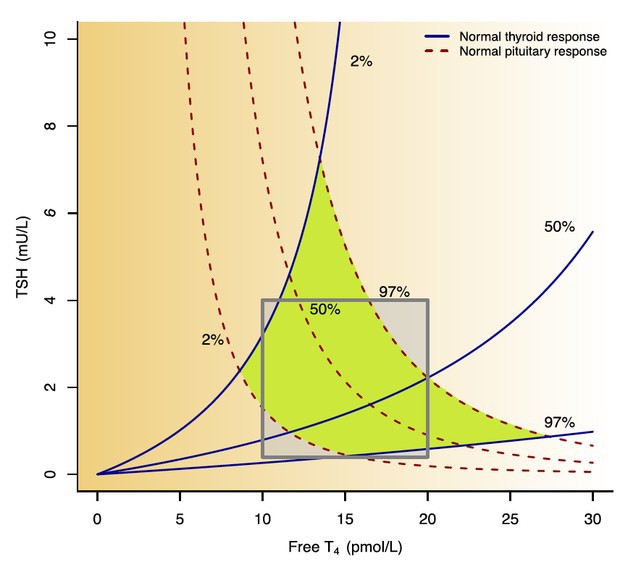
Alterations of thyroid function, especially hypothyroidism, are exceptionally common conditions. Studies from several developed countries revealed the prevalence of subclinical and overt hypothyroidism to be between 5 and 15 % and between 1 and 10%, respectively. Diagnosis and treatment of (overt or subclinical) hypothyroidism are considered to be easy tasks, since thyrotropin (TSH) concentration mirrors the supply with thyroid hormones and is therefore accepted as a biomarker for both diagnosis and dose calibration for substitution therapy.
Recently, however, a new debate on the width of the TSH reference range has emerged. It questions if certain TSH levels in a subrange of the traditional reference interval still mirror euthyroidism or if it is necessary to narrow the reference range to an upper limit of 2.5 mIU/L. Additionally, up to 15 % of hypothyroid patient on substitution therapy suffer from reduced quality of life, even if normal TSH levels suggest an adequate supply of thyroid hormones. The underlying cause for this “syndrome T” is at present unclear but is now being elucidated by current research. The situation is even more elusive in patients with non-thyroidal illness, since a large proportion of patients suffering from critical illness, tumors, uremia or starvation demonstrate some form of thyroid allostasis that interferes with diagnosis of thyroid dysfunction.
In the light of these uncertainties, It is therefore necessary to revisit our current understanding of thyroid homeostasis. Recent research suggested that the control of thyroid hormone concentrations is a complex, dynamic system, which integrates central and peripheral mechanisms to adjust for situation-dependent demand of thyroid signaling. Combining mathematical modelling of integrative thyroid control, molecular research on non-classical thyroid hormones, transport and conversion mechanisms and clinical trials with advanced methodology promises new insights that may lay the foundation for improved diagnosis and therapy of thyroid disorders. Additionally, this innovative approach paves the way for personalized treatment of hypothyroid patients.
Articles in this research topic include basic research papers and review articles that give a comprehensive overview on state-of-the-art methodology and recent results from the emerging new world of thyroidology, which tries to rationalize a scenario of previously unknown complexity.
Manuscript submission deadline: March 31st, 2016
Stats
- Recommendations +1 100% positive of 1 vote(s)
- Views 1176
- Comments 1
Recommended
-

Johannes W. Dietrich
Adjunct Professor | Medical Faculty, Ruhr University Bochum
Also:
- Elected member | Leibniz Society of Sciences
- Member | Center for Thyroid Medicine Ruhr University Bochum
- Head | Zentrum für Diabetes-Technologie (ZDT) Blankenstein Hospital
- Head | Zentrum für seltene endokrine Erkrankungen / Centre for Rare Endocrine Diseases Ruhr University Bochum
- Head | Diabetes Centre Bochum/Hattingen Blankenstein Hospital
- Head | Sektion Diabetologie, Endokrinologie und Stoffwechsel Ruhr University Bochum
- Collaborator | CeSER - Centrum für Seltene Erkrankungen (ZSE) der Ruhr-Universität Bochum und der Universität Witten-Herdecke Ruhr University Bochum
- Medical Advisor | Thyroid UK
- Clinical cooperation partner and statistical advisor | KreLo Medical Diagnostics
- Cofounder, Shareholder | INSTRUCT AG
Post a comment
Comments
-

Johannes W. Dietrich Tuesday, 12 February 2019 - 15:47 UTC
The Research Topic is closed now. You may download all articles (as single entities and collected as an eBook) from https://www.frontiersin.org/research-topics/4262/homeostasis-and-allostasis-of-thyroid-function or https://doi.org/10.3389/978-2-88945-570-6